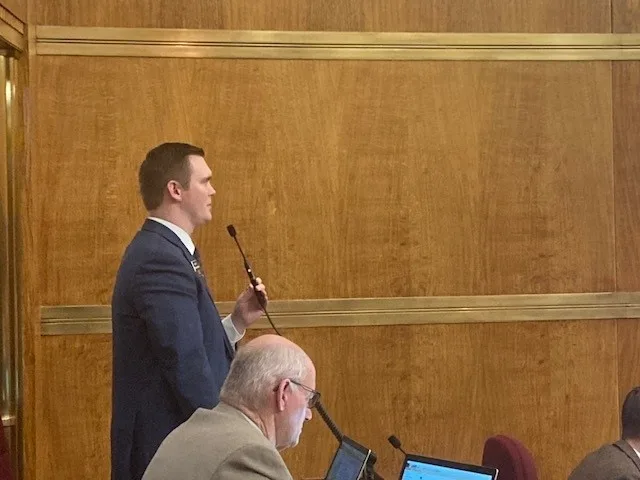

BISMARCK – The North Dakota State Senate passed a bill Wednesday to remove the upper trigger on the oil extraction tax.
House Bill 1286 would remove the upper trigger on oil extraction tax with the exception of tax on oil wells within the Fort Berthold Reservation boundaries. The upper trigger means if the price of oil rises above a certain level based on West Texas Intermediate crude, the rate of the extraction tax rises from five percent to six percent. The bill came out of the Senate Finance and Taxation committee with a vote of three to three and without recommendation.
Sen. Jordan Kannianen, R-Dis. 4, Stanley, said North Dakota levies two taxes on the oil industry: the gross production tax and the oil extraction tax, the latter of which was put into play in 1980 through an initiated measure. At that time it was a six and a half percent tax rate.
Kannianen said for many years there was a lower trigger on oil tax, meaning when the price of oil went below a certain level, the tax dropped out completely. In 2015, the lower trigger was changed, and Kannianen explained it was changed because of fear of what might happen to the revenue of the state because of the oil prices.
“Within a two week stretch at the end of the 2015 session, both chambers introduced and passed a bill and the governor signed it, which got rid of that lower trigger but then lowered the overall rate from six and a half to five percent,” said Kannianen. “An upper trigger was added at that time of one percent, so when the oil went above a certain price an extra one percent of tax was levied.”
Kannianen explained the reason for the exceptions on the reservation is because the state would have to redo and resign its agreement with the Three Affiliated Tribes.
“There is an opt out clause for them if the tribes want to opt out of that tax increase should that come. That would be their option,” said Kannianen.
“The trigger price for 2023 will be $115.55,” said Sen. Dale Patten, R-Dis. 26, Watford City. “The trigger tax is the only tax that we have that is progressive in that it goes up when a certain price per unit is reached. It’s a percent tax on gross revenue, not on net profit.”
Patten said the golden goose of the state’s oil and gas industry generated more than 50% of its direct tax revenue, and considering the ancillary revenue, he said revenue from the oil and gas industry would be in the neighborhood of 65-70% of all the state’s direct tax revenue. He added that 95% of the revenue from this tax comes from four counties -- McHenzie, Williams, Mountrail, and Dunn.
“One hundred percent of our counties benefit from this tax revenue,” said Patten. ”When oil prices rise the industry generates what’s called free cash flow. This gives the operating companies the necessary capital to invest in further drilling and enhanced recovery programs without having to go to Wall Street for the other capital markets.”
Patten provided senators with a chart showing that in 2015, the Bakken in Western North Dakota and the Permian in Texas were producing the same amount of oil. By January 2023, he said the production of the Permian was more than five times the production of the Bakken.
“That shows where the capital is being allocated, and it’s in Texas,” said Patten. “We are competing with other states for capital to further develop our energy sector, and we are losing.”
“The trigger law is only eight years old, and I’ve heard high praise from the former majority leader, and the former Tax and Finance chairman,” said Sen. Jeff Magrum, R-Dis. 8, Hazelton. “With this bill, the lobbyists keep on commenting that this is bad tax policy. We’ve passed a lot of tax exemptions here for oil and gas, and I’ve always been very supportive of the oil and gas industry.”
Magrum said the legislature is trying to pass tax exemptions for natural gas pipelines and a reduction tax on the restimulating wealth. He added the state currently has property and sales tax exemptions for CO2 pipelines and said the income and property tax relief being proposed will greatly benefit the industry. Magrum pointed out that the trigger since 2015 has happened once and cost the oil industry $135 million.
“Oil has been big business in this state for 82 years,” said Sen. Merrill Piepkorn, D-Dis 44, Fargo. “It has survived and thrived many bumps. This is my fourth session, and every session, no matter what committee I’m in, the companies come looking for another break or to rescind a previous law, and it just will never stop.”
Piepkorn said he believes the oil industry gained billions of dollars when the overall extraction tax rate was lowered from six and a half to five percent.
“The $135 million payment due to the few months of high oil prices, just coincidentally that would be about enough to pay for lunch for every school kid in North Dakota for two years,” said Piepkorn.
Majority Leader Sen. David Hogue, R-Dis. 38, Minot, said the legislators should always strive to make good tax policy.
“None of us likes to pay taxes, and at least there’s the consolation that if the tax policy is fair, we’ll abide by that,” said Hogue. “And here we are, we’re in a historic session where we’re planning to give the most amount of tax dollars back to the people of North Dakota that we’ve ever given in our state’s history. The overwhelming majority of tax dollars comes from this industry. So why wouldn’t we want to give them some of that tax relief?”
HB1286 passed in the House by a vote of 72 to 21 and the Senate by a vote of 36 to 10. The bill will be sent to the governor’s desk for consideration.